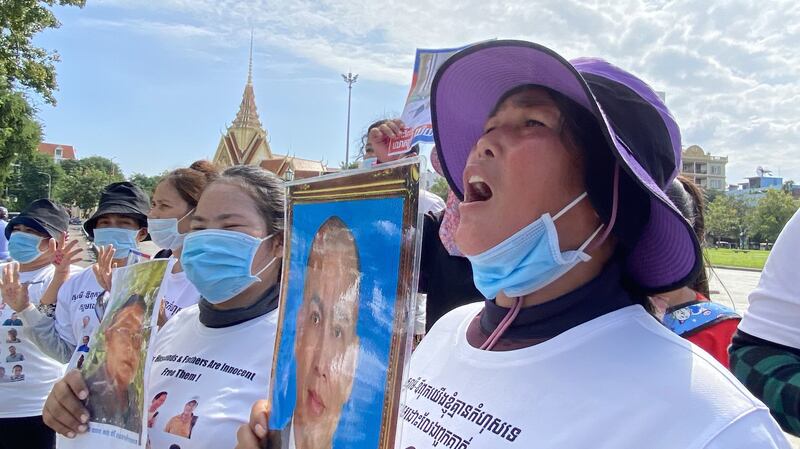Authorities in Cambodia’s capital Phnom Penh broke up yet another protest by more than a dozen wives and relatives of jailed opposition activists Friday, less than a week ahead of a scheduled court hearing for more than 100 of the party’s members and representatives of nongovernmental organizations.
Friday’s protest marked the third time family members of detained activists with the banned Cambodia National Rescue Party (CNRP) gathered in front of the Royal Palace, calling on King Norodom Sihamoni to grant clemency to their loved ones—most of whom have been jailed on “incitement” charges after expressing views critical of Prime Minister Hun Sen’s leadership.
The “Friday Wives,” as they are increasingly referred to, have held weekly demonstrations in the capital demanding that they be freed.
However, before the protesters could deliver a petition to representatives of the king, around 50 security personnel from Phnom Penh’s Daun Penh district violently dispersed them, pushing them and threatening them with arrest. The authorities also used loudspeakers to denounce local rights groups and the United Nations Human Rights Organization (UNHCR), who they accused—without presenting evidence—of facilitating the protest.
Ouk Chanthy, the wife of CNRP member Yim Sareth, told RFA’s Khmer Service that authorities kicked her in the leg during the confrontation, leaving her unable to walk.
She said it had been eight months since her husband lost his freedom and that she has been protesting in front of the Phnom Penh Municipal Court for his release, insisting that he committed no crime. She added that she has suffered both mentally and physically after being violently dispersed by the authorities during several protests.
Ouk Chanthy said she is very worried about the health of her husband, who suffers from high blood pressure and other ailments.
“I would like to call on national and international organizations, as well as the king, to please help us—we are women!” she said.
“All of us have suffered grave injustice. Since our husbands were incarcerated, the life of each family has deteriorated. Coming out to protest, we never know what we will face. But for the sake of our husbands, for the sake of our families, we must speak out to demand their release.”
Prim Chantha, the wife of CNRP member Kak Komphear, said authorities prohibited her group from shouting on the pretext that it “disturbed the king,” all while the authorities used loudspeakers to disperse people.
“The Phnom Penh Municipality should not have sent district security guards to disperse us violently like this,” she said. “We are women and every day we are like the living dead because they arrested our husbands.”
After being dispersed from the Royal Palace to a stupa in nearby Wat Botum pagoda, the women decided to proceed to the British Embassy to inquire about a past petition calling for London’s intervention. However, the authorities used vehicles and motorbikes to chase them as they walked to the site.
A representative of the embassy told the women that British Ambassador to Cambodia Tina Redshaw was not in her office.
Speaking to RFA, Ny Sokha—a worker with the Cambodian rights group ADHOC—slammed the authorities for their actions on Friday.
“The government, especially state authorities, has failed to guarantee that people enjoy their rights to non-violent protest, in accordance with the principles of human rights,” he said. “We have seen some liberal countries condemn these acts.”

Nov. 26 hearing
Friday’s protest comes as the Phnom Penh Municipal Court announced plans to hear cases en masse against more than 100 CNRP members and NGO representatives on Nov. 26.
Political Commentator Meas Nee said the move could indicate that Hun Sen’s government hopes to conclude cases with the opposition and move towards political reconciliation.
Kem Sokha, president of the CNRP, was arrested in September 2017 over an alleged plot to overthrow the government with U.S. help. Cambodia’s Supreme Court banned his party in November that year for its supposed role in the scheme.
The move to dissolve the CNRP marked the beginning of a wider crackdown by Hun Sen on the political opposition, NGOs, and the independent media that paved the way for his ruling Cambodian People’s Party (CPP) to win all 125 seats in the country’s July 2018 general election.
“The move by the court occurs at the same time when there are rumors saying that some CNRP officials who don’t apply for political rehabilitation could be automatically granted such political rights by the government so that they could form a new party,” Meas Nee said.
“But we are still waiting to see whether only subordinate-level CNRP officials could be granted such political rehabilitation, leaving the top leaders of the CNRP to be charged so that the two leaders [Kem Sokha and Acting President Sam Rainsy] are divided.”
Another political commentator, Ly Srey Sros, disagreed, however.
“I see it differently—it may be adding further burdens against CNRP supporters,” she said.
“I don’t see that there will any political reconciliation. I don’t believe that there will be many CNRP members able to attend the hearing on Nov. 26. The court may prolong the cases and move to ruling by convicting all these CNRP members.”
Reported by RFA’s Khmer Service. Translated by Sovannarith Keo. Written in English by Joshua Lipes.
